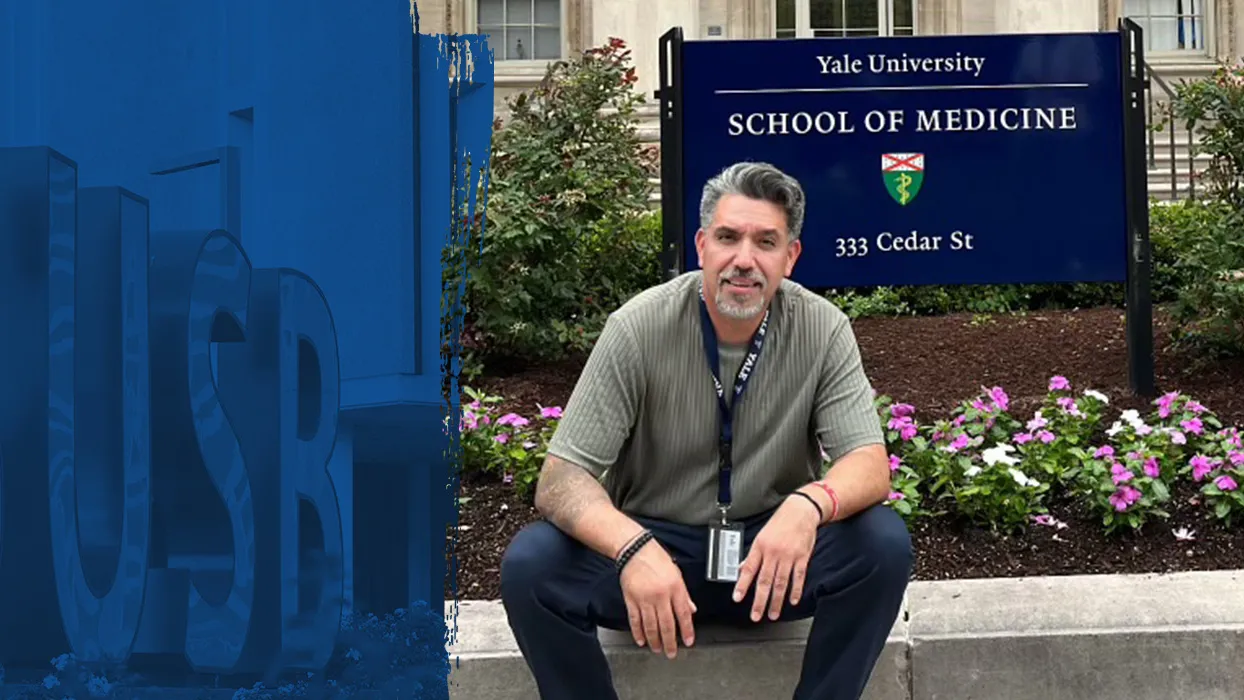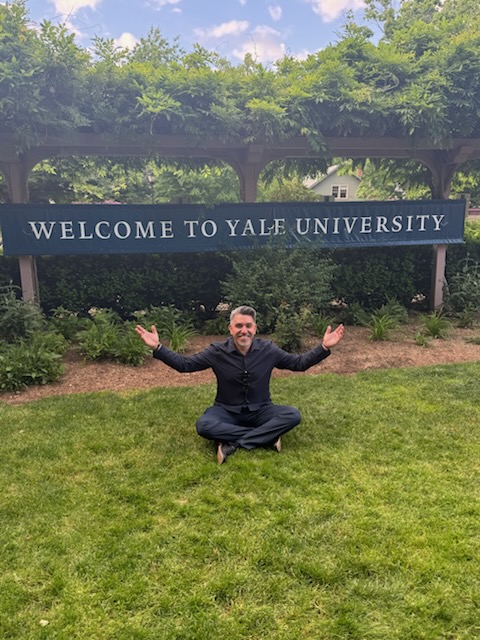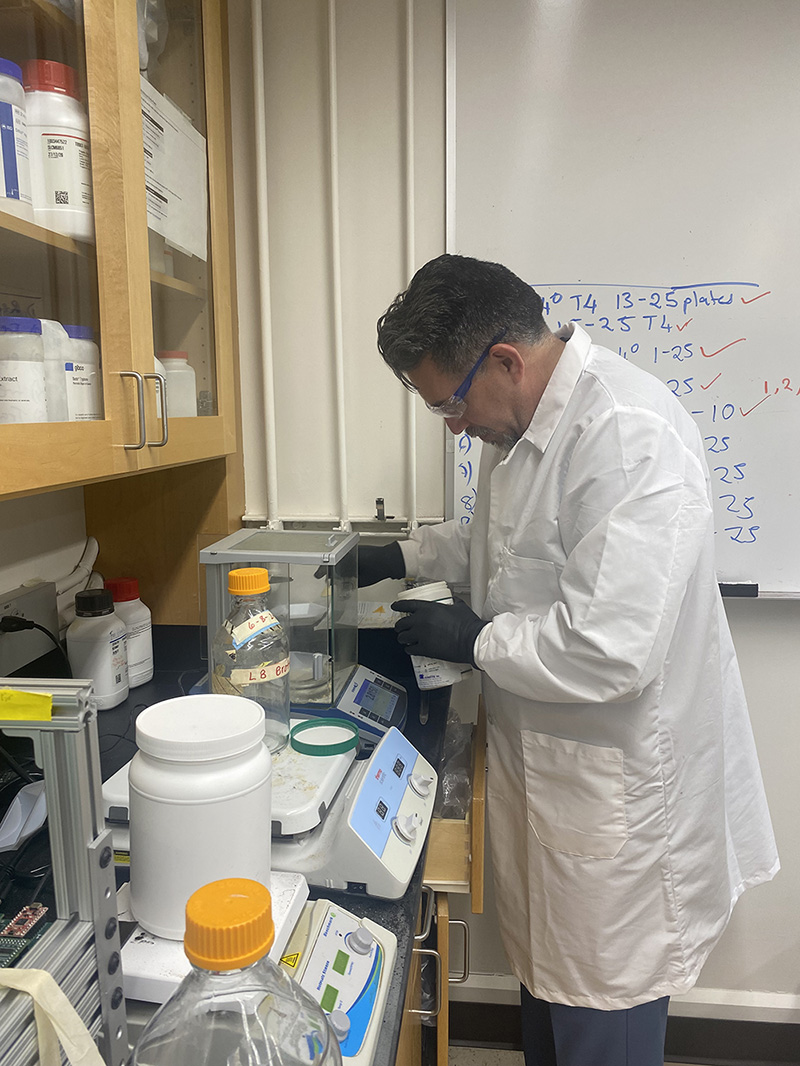Alan Llavore | Office of Marketing and Communications | (909) 537-5007 | allavore@csusb.edu

In a little more than one year, Luis Trujillo went from being an inmate confined to the concrete walls of a California state penitentiary cell block to becoming a student research fellow exploring the ivy-covered halls of Yale University in Connecticut, one of the world’s leading research institutions.
A senior majoring in biopsychology, Trujillo was one of only six formerly incarcerated students nationwide selected to participate in the National Science Foundation (NSF) Research Experience for Undergraduates (REU) Computational Analysis of Infectious Diseases last summer.
The goal of the 10-week residency program at Yale, held May 28 to Aug. 2, was to expand STEM training and computational exposure to historically disadvantaged students with limited exposure to computing during incarceration. The first-of-its-kind program incorporated faculty mentors from various departments at Yale University, including the Department of Ecology and Evolutionary Biology and the School of Public Health. The program was the vision of Director C. Brandon Ogbunu, Ph.D., and Co-Director Jacqueline Tanaka, Ph.D.
According to Trujillo, the 10 weeks went quickly. He participated in a pioneering program on computational analysis in infectious diseases. In the Ogbunu Lab, he honed his pipeline and assay design skills, enhanced his ability to analyze complex biological data and gained the essential tools to conduct impactful and responsible research. He acquired hands-on experience in pluripotent stem cell research in psychiatric disorders in the Brennand Lab. He collaborated with post-doctoral students in the Montalvo-Ortiz Lab in the Wu-Tsai Neuroscience Center. He conducted data analysis for a genome-wide association study focused on postmortem veterans diagnosed with PTSD and major depressive disorder.

The multifaceted experience “deepened my expertise in computational analysis and infectious diseases and fostered my growth as a researcher dedicated to addressing health disparities through innovative scientific inquiry,” Trujillo said. “My time at Yale has solidified my commitment to integrating computational approaches with experimental science to contribute to transformative advancements in public health.”
Most importantly, he said, “Dr. Ogbunu and Dr. Tanaka believed in us; they saw something in us that we could not see in ourselves.”
Trujillo’s journey from serving a life sentence in prison to applying for Ph.D. programs has been remarkable.
At age 12, he dropped out of school during seventh grade and said he spent most of his young life in and out of the juvenile justice system. He welcomed the first of two daughters at age 17, earned his GED and was offered an opportunity to work as an educational assistant in the San Bernardino County Superintendent of Schools office. He was attending San Bernadino Community College, but “I struggled to take care of my daughters, work two jobs and attend class. All of it became far too overwhelming. My educational gaps and disparities couldn’t be masked or ignored. Fearing I might fail, I quit — a decision I would regret for decades.”
Struggling with untreated childhood trauma and undiagnosed depression, Trujillo got caught up with drugs and ultimately was involved in a fatal shooting. He still struggles with the shame and guilt associated with the loss of a man's life. In 1998, at age 21, he was sentenced to 50-years-to-life in prison. At that point, he said, “any dream of higher education was out of sight. When I went to college before I was incarcerated, there were so many gaps in my early education.”
But in 2015, an agreement between the California Department of Corrections and Rehabilitation and the California Community Colleges allowed incarcerated individuals to take in-person community college classes and correspondence courses, at no cost.
Trujillo began his college education in earnest.
“I started taking as many classes as possible and fell in love with learning,” he said. “The more classes that I took, the more the world came into focus for me.” As he explored the world of neuroscience and psychological theories, he learned more about himself and began to implement mindfulness and meditation into daily practices.
“You have to find the courage to look at yourself, the good, the bad and the ugly,” he said. “I want to be the best person I can be, and to do that, you need to have that deep introspection.”
He also learned about Adverse Childhood Experiences and the roles trauma and toxic stress played in his own life, subjects that are now the focus of his research. “I now understand better than I ever have before how childhood sexual abuse warped my biopsychosocial development; this is why I abused drugs and alcohol — to numb the shame,” he said. “I say this now because I want to be brave in my life. I don’t want anyone to have to suffer through what I have endured. So, I am educating myself to help others understand the neurobiology of shame.”

Trujillo noted that although “I was on a new level of learning, my environment was academically challenging because (in prison) we didn’t have access to the tools and resources regular college students have.” At times, there were no professors available to answer questions, no tutors and no access to online resources, and he struggled with math and English. Coupled with the safety concerns and violence that the prison environment posed, pursuing his education was particularly challenging.
But the words of Gaylla Finnel, a mentor and professor of political science at Imperial Valley College, inspired him: "The more education you have, the less you'll be defined by your crime." Trujillo went on to earn six associate’s degrees and served as his class valedictorian.
Before he was released from prison in May 2023, another mentor, Robin Myers-Li, Ed.D., encouraged him to seek the support of Project Rebound when he continued his higher education. Project Rebound provides support and guidance for individuals who were formerly incarcerated as they navigate the higher education system. Her recommendation would prove to be life-changing.
Upon release, he began his new life at a transitional living residence near Cal State San Bernadino and enrolled at CSUSB through the help of Project Rebound. He began classes that fall and declared his major in psychology with a concentration in biopsychology. He became a juvenile justice student assistant with Project Rebound and serves as the president of Club Rebound.
“I feel that I have a responsibility to others,” he said. “I want to do something meaningful with my life.”
It was through Annika Anderson, chair of the Department of Sociology and executive director of Project Rebound, that he heard of the residency opportunity at Yale.
Today, Trujillo is studying the biopsychosocial effects of trauma by exploring the relationship between cortisol (stress hormone), serotonin (mood, sleep, behavior, and attention hormone), and oxytocin (trust and bonding hormone) in incarcerated individuals and how these hormones correlate with childhood trauma, ACES scores, shame and resiliency. He is conducting this research with principal investigator Andrea Giuffre, professor of criminology and Project Rebound researcher at CSUSB.
He aims to understand how adverse childhood experiences dysregulate neurodevelopment and contribute to generational trauma. His research focuses on why some individuals with traumatic pasts thrive while others struggle, emphasizing the role of shame in complex PTSD. He describes shame as a deep-seated feeling of unworthiness, differentiating it from guilt, which is tied to specific actions.
On course to graduate in May, Trujillo has applied to two post-baccalaureate programs, one at Harvard and one at PIKE-Prep in Colorado, and to two master’s degree programs at the University of Southern California, one in addiction science and one in neuroimaging.
“I fully intend to pursue my Ph.D. in neurobiology,” he added.
“I want nothing more than to highlight the tremendous potential of our Project Rebound community. Our opportunities are endless under the guidance and leadership of Dr. Annika Anderson, Michael Griggs and Sofia Alvarenga at Project Rebound. We are resilient, determined and relentless in our pursuit to profoundly impact our communities positively and meaningfully,” he said.
“We are all very much aware of the fact that we cannot go back in time and rewrite a better past for ourselves, but we are working tremendously hard to write a better future for ourselves and our families. If given the opportunity, we will provide everything to improve our communities.”